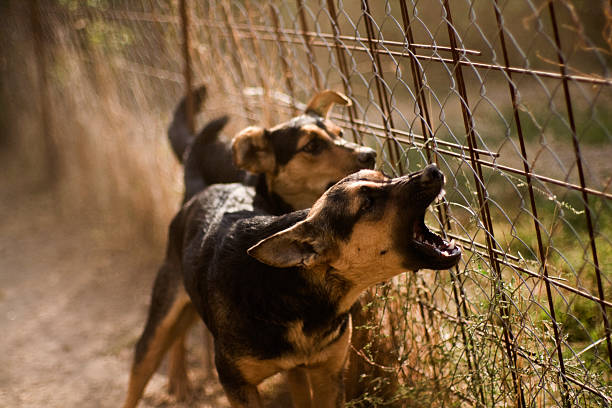Do Dogs Get Tired of Barking? (The Fact May Surprise You)
Before getting straight into the topics we just need to explain a few things that need to be addressed here:
Barking is defined as one of many types of loud and vocal communication by dogs. People often become delighted when their dogs husk because it alerts and makes them aware of the approach of people crashing into their homes, or it tells them that there’s something that the dog wants to tell them, or there is something that their dog needs.
However, sometimes a dog barks excessively. Because barking may be due to a mixture of reasons, dog masters must identify the cause of barking and their dog’s motivation for barking before they go to treat a barking problem.
Every type of barking may be due to a distinct cause for a dog, and if he is repeatedly rewarded and encouraged for his barking—in other words, if his barking every time brings him what he wants—he may learn to use barking to get benefits.
For instance, the dogs who successfully bark to seek attention often of their owner go on barking for other benefits, such as food, play, and walks. For this reason, it is necessary to teach your dog to be quiet on cue so that you may prevent his attention-related barking and train him to practice some other behaviors instead—like sitting or down—to ask for what he needs.
Many owners can identify the reason why their dogs are barking just by listening to the specific bark of their dog. For example, a dog’s bark may sound different when the dog wants to play and have some joy as compared to his bark when the dog wants to come in from the yard. If someone wants to reduce their dog’s barking, it’s important to recognize the reason for his barking. It may take some time to train your dog to bark less frequently.
Unfortunately, it is just not possible to expect a fast or instant fix or to expect that the dog will stop barking altogether. The goal should be realistic, i.e., to decrease, rather than eliminate, the amount of barking. Keep in mind that some dogs can be more prone to barking than others. In addition, some dog breeds are called “barkers,” and it can be harder for them to reduce barking in individuals of these breeds.
Why do dogs bark?
Some of the reasons for dogs barking include:

Territorial Barking:
Dogs may bark oftentimes in reaction to the people, dogs, or other creatures within their area or approaching their territories. Your dog’s territory can comprise the area encircling its home and, ultimately, anywhere he has been on, or associated strongly with its owner: the owner’s car, the route its owner takes during walks, and other places where the dog spends a lot of time.
Alarm Barking:
If someone’s dog barks at any or every noise and sight regardless of the reason and context, he may be doing a type of barking called alarm barking. Dogs involved in alarm barking usually have slightly stiffer and maybe a little harsh body language than the other dogs barking to greet, and they usually move a little or pounce forward an inch or two while barking, with each bark.
Alarm barking is distinct from territorial barking in that a dog may alarm bark at some scenes or sounds at any location at all, not only when he is protecting his familiar areas, such as the owner’s house, his yard, or his car.
Attention-Seeking Barking:
Some dogs bark to seek attention from their owner or to get rewards, like food, toys, or play.
In this pursuit, such dogs may bark at other people or other dogs.
Greeting Barking:
Some dogs might bark in greeting if they bark when they see people or other dogs coming toward them and their body is relaxed and comfortable, they are excited and their tails are wagging. Dogs who bark while greeting people or other animals may also whine.
Compulsive Barking:
Some dogs bark frequently in a repetitive manner, like a broken record. Such dogs often move extensively as well. For example, a dog who is barking repeatedly may run back and forth along with the railing in its enclosure or stride in its home.
Socially Facilitated Barking:
Some dogs bark continually only when they listen to other canines barking close. This category of barking is performed in the social context of listening to other dogs barking close or even at a distance—for example, dogs in the neighboring areas.
Frustration-Induced Barking:
Some dogs bark repeatedly only when they are enduring a frustrating situation, such as when they can not permit their comrades or when they are detained or tied up and trotted so that their activity is prohibited.
Other Problems That Can Cause Barking:
Illness or Injury:
Dogs may sometimes bark as a response to pain or a painful condition they may be facing. Before you strive to solve your pet’s barking trouble, please have your dog thoroughly investigated by a veterinarian to rule out medical causes.
Separation-Anxiety Barking:
Excessive barking may be due to separation anxiety that occurs only when a dog’s caretaker or owner is not present near him or is gone or when the dog is left and he feels alone. You will usually see at least one of the other separation anxiety symptoms, such as pacing, destruction, elimination, depression, or some other signs of anxiety.
What someone can do about their dog’s excessive barking:
The first step taken to reduce your dog’s barking is to know the type of barking your dog is showing. Some of the following questions may be helpful for you to accurately determine which type of barking your dog is expressing so that you may best try to solve your dog’s problem.
You just need to think about your answers to the questions given below, to deal with your dog’s excessive barking:

- Where and when does the dog start barking?
- Who or what is the target of your dog’s barking?
- What stuff (items, sounds, creatures, or people) provoke your dog’s barking?
- Why does your dog bark?
If it is territorial barking or alarm barking, territorial behavior is usually triggered by both fear and anticipation of a perceived threat or fear. Because upholding sovereignty is such a great prerogative for them, many dogs are largely impelled to bark when they detect any method of unidentified people or creatures near knowledgeable sovereignty, such as their homes or lawns.
This high level of enthusiasm indicates that when barking territorially, the puppy may dismiss unpleasantly or punish reactions from the owner, such as scolding or yelling.
Even if the barking of the dog itself may get suppressed by the punishment, the dog’s motivation to protect his territory will stay strong, and he might attempt again to guard his territory in some other way, such as biting without any warning or orbiting without barking.
Dogs can commit territorial barking to entice other people about the existence of guests or to frighten the intruders or for them both. A dog may bark when he sees or hears people leading the way towards the entrance, the post messenger arriving to distribute the mail, or the sustenance man reaching to read the gas meter.
The dog may also react to the sights and sounds of some people or other dogs passing by the owner’s house or apartment. Some dogs can also get riled up while they are in the car and they see people or dogs passing by. The owner should be able to judge from his dog’s body position and behavior whether he is barking to welcome or to threaten. If you are dealing with a dog who is barking to welcome someone you just need to follow a treatment.
If you are dealing with a dog in the barking category who is not friendly and nice to people and barks to threaten, you will feel easier if you limit your dog’s ability to see or hear passersby and train him to associate with the presence of unknown passerby with good gestures, such as food and attention.
To deal with the territorial barking, your dog’s enthusiasm must be diminished as well as his chances to shield his sovereignty must be curbed. To tackle your dog’s behavior, you will need to block his ability to face people and animals. Removable plastic films or spray-based glass coatings may help to obscure the dog’s view of areas that he faces and protect him from within the owner’s house.
Use secure, opaque fencing to surround outside areas that the dog has access to. Just don’t authorize the dog to behold and confront people at the outdoor entrance, at the front of your yard portal, or your commodity boundary line. Rather, educate your dog to
go to some alternate site, such as a crate or a rug, and stay peaceful unless he is asked to see or entertain appropriately.
Dogs are sensitive animals, and they are not meant to stay alone. A dog who is left alone in the backyard or house all the time may be triggered to bark just because he feels lonely and bored. In such cases, spending a lot of time with his humans regularly, getting a dog sitter or caretaker while you are out of the place for the day, or taking him to a dog’s daycare may be all it takes to resolve the problem.
Stress: There are many reasons a dog may feel stressed or anxious and all of such reasons can lead to excessive barking. Calming collars, shirts, or diffusers may help provide a solution for mild stress. Extreme or severe cases may require medication or behavioral therapy.
Alarm barking is something similar to territorial barking in that it may be triggered by sights and sounds. However, dogs that alarm bark can do so in response to things that make them upset when they are not on familiar turf. For instance, a dog who is barking territorially in response to seeing people who are strangers approaching him, he will usually only do so when he is in his own home, yard, or owner’s car.
In contrast, a dog who is habitual in alarm barking may vocalize when he sees or hears some strangers approaching in the other places which are not a part of his territory, too. Although territorial barking and alarm barking are a bit different, they may be resolved using similar treatment and training methods.
Make sure your pet gets a lot of playtime and exercise and meditation as doing this only could help to solve constant barking.
Do dogs get tired of barking?
Dogs do not get fatigued from barking significantly, but when a dog gets tired he may bark less. Every dog barks, and there can be various reasons why a dog uses his voice that may indicate fear, alarm, an expression of greeting, and even boredom. While you can’t expect a dog to stay silent, excessive barking may indicate a sign of a problem.

A dog who shows this behavior will not stop barking just because he got tired of barking. Instead, the owner will have to pinpoint the reason for the behavior and work on them to solve this problem.
Related Posts
- Can Dogs Eat Mangos?
- Do Dogs Get Tired of Barking? (The Fact May Surprise You)
- Can Dogs Eat Marmite? (Everything You Need To Know)
- 21+ Best Brown Cat Breeds You Should Know
- Want a Pet Lobster at Home? (Know All Facts)
- Why is My Cat Twitching in His Sleep?
- What Smells Deter Cats From Peeing? (It May Surprise You)
- Why Do Cats Scream When Mating? (This May Surprise You)
- Why Are My Cats Ears Hot? (Everything You Need To Know)
- Why Does My Dog Keep Sneezing?






